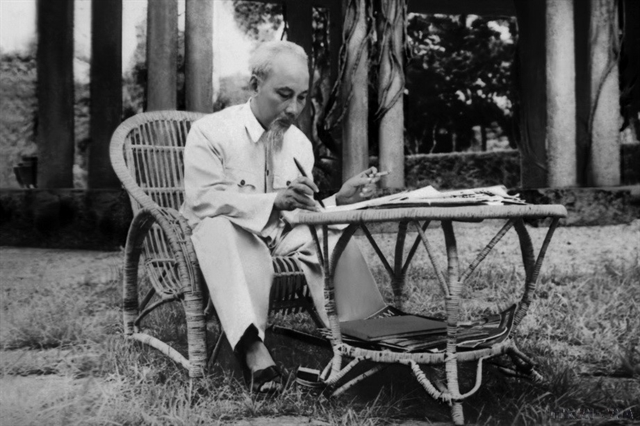 World
World

Cicero, one of Rome’s most famous orators said: “We were born to unite with our fellow men, and to join in community with the human race.” The quotation perhaps best reflects Goal 17 of the Sustainable Development Goals, a goal that calls for partnerships.
57383540PM.jpeg) |
Co-authored by:
H.E. Mr. Vongthep Arthakaivalvatee, Deputy Secretary-General of ASEAN Socio-Cultural Community;
Haoliang Xu, UN Assistant Secretary-General and UNDP Director of Asia-Pacific
Cicero, one of Rome’s most famous orators said: “We were born to unite with our fellow men, and to join in community with the human race.” The quotation perhaps best reflects Goal 17 of the Sustainable Development Goals, a goal that calls for partnerships.
Realizing the SDGs by 2030 is a daunting task by all accounts. But only through partnerships can we strengthen global effort toward eradicating poverty, and meeting the other 16 goals that cut across it.
Nowhere is that case for partnerships more critical than in the ASEAN region, because the force of partnerships here will ripple across the region serving as a model for change across the world.
With over 600 million people, the ASEAN region is dynamic and diverse. It has made great progress across social, economic and environmental pillars encompassed in the 2030 Agenda.
Extreme poverty is falling rapidly across much of the region, from 17% of the region’s population in 2005 to 7% in 2013. Tremendous progress has been made in access to education, now above 95% at the primary level in all countries.
Yet even in countries where extreme poverty has fallen, there remain millions of working poor that are vulnerable to falling back into poverty. Besides the need of lifting the remaining 7% out of poverty, a common challenge in the region is the ‘missing middle’ where people experience rising incomes, but lack access to basic services.
Climate change continues to be a cause of grave concern. It affects everyone, albeit not equally, and has the potential to derail progress on many of the SDGs. ASEAN is among the most disaster-prone regions in the world: four ASEAN countries are among the ten countries most exposed to natural hazards worldwide.
ASEAN also faces new challenges and mega trends, such as urbanization, rapid technological advances and emerging demographic shift, which will shape the region’s development landscape, and therefore, its future.
Given these challenges, and the fact that the Asian economy is the engine of progress well beyond borders, it’s clear that solutions developed here will have an impact across the world.
It is estimated that it will take trillions of dollars and innovative solutions to achieve the SDGs. If we are to get there – even to raise the finances and to be innovative – we will require that lynchpin of all the goals: Partnerships.
That’s why ASEAN, China and the UNDP are partnering together, so that our combined expertise and experience will bring together key players to make a greater impact and try to achieve the goals faster.
ASEAN has the convening power to ensure leadership, commitment and vision are unified across the countries. Celebrating its 50th anniversary this year, the ASEAN Community has worked continuously to bring regional perspectives into the international policy process and help its members implement global commitments. The ASEAN Community Vision 2025 is a great example of this and testament to the priority given by ASEAN Leaders to sustainable development in line with Agenda 2030.
ASEAN also sees the SDGs as crucial to its new – “Culture of Prevention” initiative aimed to address the root causes of violent extremism and conflicts. Such an approach is conducive to the development of a human resource base that supports the sustained economic growth of ASEAN.
China, Asia’s economic powerhouse, plays a vital role in any discussion on financing in the region. It has contributed heavily to the progress in the ASEAN region, and its latest venture, the newly established Asia Infrastructure Investment Bank, brings promise of even more progress for sustainable development.
Coupled with this, China also has valuable experiences to share with other countries and do so with the ASEAN community through strong knowledge exchange mechanisms.
UNDP has unparalleled expertise in accelerating sustainable development, working hand-in-hand with governments across the globe on how to address complex development challenges through innovation.
Through its network of country offices in the ASEAN region and across the world, UNDP has developed strong relationships and has the expertise to mobilize multi-stakeholder partnerships for action on a wide range of complex development issues.
For instance, in Indonesia, UNDP is working with the government and BAZNAS, the national zakat agency, to channel some of the zakat money to help achieve the SDGs. Zakat is a sort of religious tax, a Muslim person’s obligation to give a portion of their wealth to charity.
While ASEAN, China and UNDP are working together to meet the goals, we appreciate that our partnership is just one step in an important journey to bring prosperity and peace across the world and to protect our planet. To finance sustainable development, all actors – public, private, domestic and international – have a role to play.
We hope our partnership will be a catalyst for other collaboration and innovation across sectors, disciplines and borders, to ensure that we achieve the 2030 agenda.—VNS




